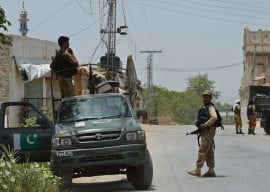
With two new cases emerging from Baldia on Wednesday, the total number of cases has reached six in Karachi and 11 in the province this year.
Except for one case from a high-risk union council (UC), all the cases were detected from 'normal' or not at risk areas. "Everything was fine till October," said Karachi commissioner Shoaib Ahmed Siddiqui. "We aggressively worked in all 11 UCs, which were high-risk areas," he added, saying that his team worked hard and now only eight UCs are very risky.
Siddiqui, like other officials, believes frequent migration is one of the reasons for polio cases in the port city.
"Refusal in such areas is another issue," he added. "We are investigating why cases came out from these particular areas."
Siddiqui has been made chairperson of the Karachi Task Force (KTF) by the Sindh government and is now responsible of ensuring an effective polio drive across the city. "Security is not the only reason [for the new polio cases emerging]," he added.

Eight-month-old Bibi Zainab and 16-month-old Muhammad are the two new cases from UC-1 and UC-4 of Baldia respectively.
The first case of 2015 was confirmed on October 8 from Shafiq Colony, Gulberg. The second case was confirmed from Keamari on November 20. The third and fourth cases surfaced from Gadap on November 30.
Provincial coordinator of the Emergency Operations Centre (EOC) Dr Muhammad Usman Chachar said the issue remains at a lower level.
"Polio teams don't work seriously, in the name of lack of security," he said. "There is weak supervision after and during the drives."
Speaking to The Express Tribune, Dr Chachar said that the quality of the drives conducted in September and October was not up to the mark. "It was improved in November, when complete security was provided to the teams," he explained.
KTF, with its action plan, will focus on four major points. It will involve UC members after the local government elections. Security, where needed, will be ensured by the KTF officials.
The district polio control room will be made functional round the clock and will, most importantly, include the training of teams. The KTF will also be responsible to conduct micro planning.
I am hopeful that the task force will effectively work and will help reduce the virus to zero by May next year, Dr Chachar said. He said that the Sindh government has instructed them to take strict measures against those who fail to perform their duties.
Health officials have not confirmed that more polio cases are pending in the laboratory. An official fears that two cases are currently pending. "I am not sure [whether or not] we'll have more cases now," the EOC head said.
Published in The Express Tribune, December 4th, 2015.



























1714024018-0/ModiLara-(1)1714024018-0-270x192.webp)









COMMENTS
Comments are moderated and generally will be posted if they are on-topic and not abusive.
For more information, please see our Comments FAQ